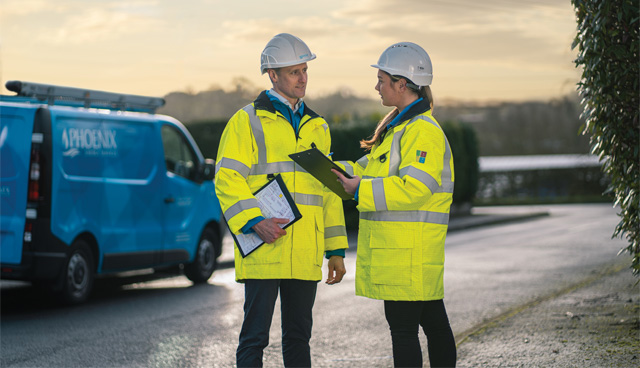Natural gas infrastructure: The journey to a low carbon future

They say that necessity is the mother of invention and nothing demonstrates that more powerfully in recent times than the decisions that have been taken and the changes that have been made as a result of the Covid-19 pandemic, writes Phoenix’s Director of Business Development Jonathan Martindale.
With more time being spent at home and staycations the popular holiday choice, there is a greater focus on the environment around us, and with changed transport and energy user habits resulting in significant carbon reductions globally since the outbreak of Covid-19, we have perhaps seen what the authors of a recent report by the Centre for Research on Energy and Clean Air meant by “a glimpse of the cleaner, healthier, environment that is possible”.
The UK Government’s announcement to bring all greenhouse gas emissions to net zero by 2050 has seen the agenda move from if and when, to the more important question of how decarbonisation can be realised. This will undoubtedly be a focus of the new Northern Ireland energy strategy, as it seeks to identify how we play our part in meeting wider UK targets and create a lower carbon future for Northern Ireland.
Unlike many region specific challenges that Northern Ireland has faced in the past, the decarbonisation challenge is being shared with many countries across the world and in the last number of years, we have seen significant investments being made in energy trials across various sectors that have created considerable momentum and increased profile globally to the extent that decarbonisation is very much at the top of most political agendas. The Energy Strategy, due for release in Autumn 2021 should be well placed to offer a Northern Ireland tailored strategy that builds on global learning but equally understands the opportunity for immediate action and harnesses the indigenous resources we have available.
As the discussion in Northern Ireland has evolved through the consultation platforms facilitated by the Department, the most notable shift recently has been the increased level of confidence that while Northern Ireland’s energy transition will be influenced by neighbouring strategies, the region is well placed to carve out a specific set of solutions that recognise the existing energy landscape.
Energy efficiency
Energy efficiency is at the heart of any low carbon economy. With a large proportion of homes with low energy efficiency ratings locally, there is a need to design and deliver an ambitious energy efficiency programme across existing housing stock and new build regulations. This must be coupled with an educational engagement campaign to influence consumer behaviour, demonstrating the financial and environmental benefits of energy efficiency measures that creates a culture of personal responsibility for efficiency in the areas each consumer can control.
Natural gas consumers have a head start here, with high efficiency control and systems installed with all new gas connections, enabling Northern Ireland’s natural gas consumers to use on average 17 per cent less energy than their Great Britain counterparts.
Natural gas infrastructure
The natural gas network in Northern Ireland is relatively new. By the end of the current GD17 Regulatory Price Control (2022) the three gas distribution network operators will have made natural gas available to circa 550,000 properties locally, around 70 per cent of properties. Of those with natural gas availability, it is estimated that 231,000 of these properties will remain unconnected to the network, most continuing to use home heating oil.
With natural gas an inherently carbon cleaner fuel than oil, this presents an immediate opportunity for carbon savings, as each property converting from an older oil boiler to a natural gas central heating system with associated controls reduces their carbon footprint by up to 50 per cent. This offers considerable carbon savings while providing increased lifestyle and convenience benefits with minimal investment and no consumer behaviour change.
If each of the 231,000 consumers with natural gas available connected to the network, natural gas users would prevent 1.5 million tonnes of CO2 being released into the atmosphere each year, a significant saving, making immediate in-roads to Northern Ireland’s decarbonisation challenge. With ambitions across the natural gas industry to further improve natural gas’s greener credentials, there can be real confidence for consumers that the network they connect to now will be the network that transports a greener form of fuel to their homes in the future.
A renewable future: Greening the natural gas network
Northern Ireland has risen to the challenge of delivering 40 per cent renewable electricity in advance of its 2020 target, thanks to technological advances that have harnessed the indigenous wind resources in abundant availability. Yet there is another indigenous renewable energy resource, that with supportive policy, could instantly support the greening of the natural gas network while helping to solve a further local decarbonisation challenge.
When organic matter is processed at an Anaerobic Digestor (AD) plant, biogas is produced and can be captured. This biogas can be upgraded to biomethane and then injected into the natural gas infrastructure, blending safely with existing natural gas. This blended mix can be accommodated without any change to the natural gas infrastructure or consumer appliances.
Already underway in the Republic of Ireland and Great Britain, and with more than 50 active AD plants in Northern Ireland, this is a circular process that recycles waste from food manufacturing, processing, farming and households. Utilising biomethane in this way also diverts methane (28 times more pollutant than CO2) from entering the atmosphere, helping offset emissions for the agricultural sector.
The Northern Ireland Renewables Obligation (NIRO) supported AD plants with renewable electric generation, however, the scheme closed for new applications in 2017, removing the mechanism to drive forward the waste to energy solution. Consequently, key waste streams in Northern Ireland are not being disposed of in a way that recovers their significant energy potential.
The Energy Strategy review must act as an enabler to springboard this workstream and in particular recognise the superior efficiencies associated with the use of organic waste for biomethane injection into the natural gas network.
Northern Ireland has an opportunity to embrace renewable gas solutions, that would be capable of delivering a significant percentage of its total heat demand from the rich indigenous opportunities that are available locally and in turn realising the added benefits of being increasingly self-sufficient.
Locally, we have partnered with Queen’s University Belfast and the AD industry to quantify the waste to energy opportunity that exists locally, with existing reports suggesting that up to 30 per cent of Northern Ireland’s heat demand could be served through this already proven energy generating process.
As with the maximisation of the natural gas network, biomethane injection is another intervention which can begin making immediate inroads in local carbon reduction.
Hydrogen
It is impossible to talk about net carbon zero goals without looking at the role hydrogen will play. The most abundant element in the universe, hydrogen, which does not emit CO2 and does not pollute the air when used, can be used as a feedstock, fuel or energy carrier and storage, with many possible applications across domestic, industrial, transport and power.
It’s perhaps no surprise therefore that countries right across the world to include the UK, Germany, South Korea and France are investing heavily in both blue and green hydrogen innovation to ensure that it plays an integral role in their respective green economies.
The H21 Leeds City Gate study was a significant piece of work that demonstrated the technical feasibility of repurposing the existing gas distribution network for hydrogen. The benefits of this for energy users is considerable.
With its abundance of natural wind resources there is a significant opportunity for Northern Ireland to develop a green hydrogen economy, utilising our natural resources, entrepreneurial spirit and size and scale to take the lead in developing hydrogen energy solutions.
Green hydrogen can be produced from renewable electricity through the electrolysis of water (in an electrolyser). This not only enables us to produce a carbon free fuel source, it also ensures the best use of renewable electricity, an increasing percentage of which is curtailed or constrained as it cannot be stored or utilised through the system at certain times.
This can then be utilised then to maximise the efficiency of our existing energy infrastructure and in turn provide a much sought-after commodity. The production of green hydrogen at source, distributed in existing gas network negates the need for bespoke energy solutions and expensive retrofit adaptations for energy users.
The £1 billion natural gas infrastructure in Northern Ireland is equipped to accommodate hydrogen as a fuel and provides an infrastructure for storage that can meet the interseasonal demand needed to accommodate Northern Ireland’s winter energy needs. This would not be first time that repurposing of an energy distribution asset has taken place in the UK, in the 1960s the gas network was successfully converted from ‘Towns Gas’ to natural gas with minimal impact to end users. In Northern Ireland this would provide a zero-carbon solution for around 70 per cent of homes that have access to natural gas infrastructure.
An additional attraction of green hydrogen production that is more relevant locally is that the process also produces O2 which can be used to help alleviate chronic capacity constraints at local Waste Water Treatment Works. The introduction of an oxygenation process into these treatment works would alleviate the capacity constraints without deployment of major works that would require significant investment.
Whilst many of the recent headlines celebrate the credential of green hydrogen it is widely recognised that the hydrogen economy will require both blue and green hydrogen solutions. Blue hydrogen is produced from natural gas, with carbon capture and storage (CCS) technology scooping up the resulting CO2.
The UK Government’s climate advisers, in their annual report released recently, backed blue hydrogen as a means to help scale-up the hydrogen economy quickly, in tandem with, not instead of, the development of green hydrogen.
Equinor is leading a project to develop one of the UK’s, and the world’s, first at-scale facilities to produce hydrogen from natural gas in combination with carbon capture and storage (CCS). The project, called Hydrogen to Humber Saltend provides the beginnings of a decarbonised industrial cluster in the Humber region, the UK’s largest by emissions.
Recognising that the need is now very much here and that decarbonisation is a shared global challenge that requires bespoke local solutions, Northern Ireland has an opportunity to embrace renewable gas solutions, that would be capable of delivering a significant percentage of its total heat demand from the rich indigenous opportunities that are available locally and in turn realising the added benefits of being increasingly self-sufficient.
Optimism
The delivery of net-zero is a challenge, but one that presents huge opportunities. Never before has there been such a united focus across policy, industry, academic and society to drive fundamental change for the better.
Whilst the energy strategy release in Autumn 2021 will play a pivotal role in propelling projects to the next stage of delivery there is no doubt that collaboration will be critical to our success in becoming a net zero carbon society. Realising there is no one solution to carbon reduction will be key, and academia, industry and energy companies must work together to provide a range of solutions to continue to meet energy users’ needs in a net zero carbon future.
It would appear that the old adage of necessity being the mother of all invention, continues to shine through and as Northern Ireland’s society have recognised the need, its over to industry to continue providing the solutions to guide all energy users through what will inevitably be a be a number of energy transition phases.
Phoenix Natural Gas Ltd.
T: 03454 55 55 55
W: www.phoenixnaturalgas.com







